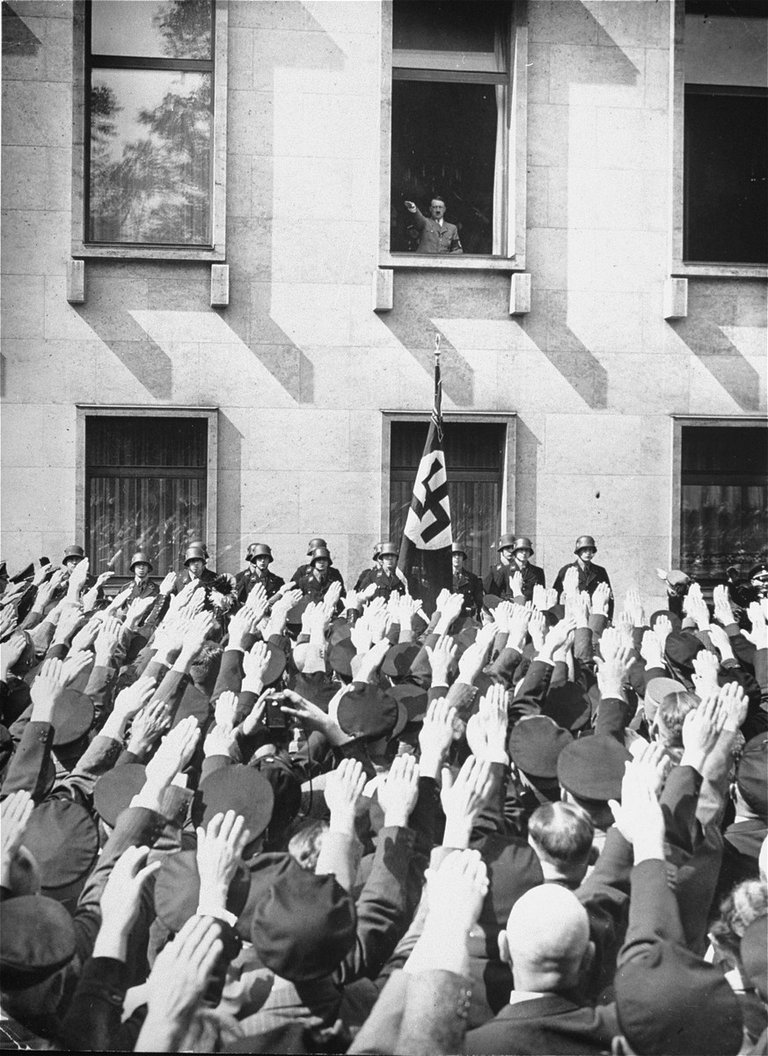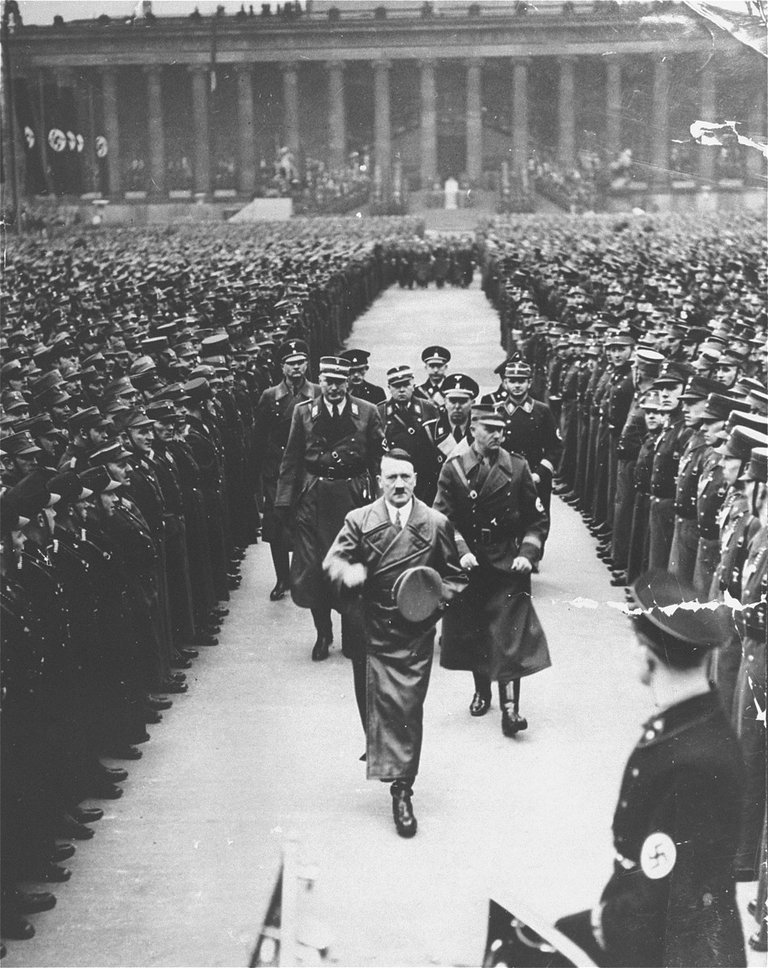Unpacking the Myth: National Socialism, Race, and Economic Facade

Image Source: https://encyclopedia.ushmm.org/content/en/gallery/nazi-terror-begins-photographs
The claim that National Socialism under Adolf Hitler wasn’t rooted in racial ideology—or that its Aryan supremacy was a "Jewish lie"—is a bold assertion that crumbles under the weight of primary evidence.
To suggest otherwise is to ignore Hitler’s own words, meticulously laid out in Mein Kampf and reinforced by his unpublished second book, as well as the economic realities of the Third Reich. Below, I’ll dismantle this notion with direct citations and historical context, proving that National Socialism was not only explicitly race-based but also a flawed collectivist experiment that masked economic collapse with plunder and war.
Hitler’s Racial Obsession in His Own Words
Let’s start with the source material. In Mein Kampf, Hitler’s fixation on the "Aryan race" as the cornerstone of his ideology is undeniable. On page 269, he writes: "The greatness of the Aryan is not based on his intellectual powers, but rather on his willingness to devote all his faculties to the service of the community."
This isn’t a vague platitude—it’s a declaration of racial collectivism, where the Aryan’s value lies in subordinating individuality to the group. Contrast this with his depiction of Jews on pages 271-272: "The Jew offers the most striking contrast to the Aryan. There is probably no other people in the world who have so developed the instinct of self-preservation as the so-called 'chosen' people… Jews act in concord only when a common danger threatens them or a common prey attracts them. Where these two motives no longer exist, the most brutal egotism appears, and these people… turn into a swarm of rats that bitterly fight against each other."
Here, Hitler paints Jews as the antithesis of Aryans—selfish, disunited, and racially inferior. This isn’t subtle; it’s the backbone of his worldview.
On page 307, he doubles down:
"A people that fails to preserve the purity of its racial blood thereby destroys the unity of the soul of the nation in all its manifestations. A disintegrated national character is the inevitable consequence of a process of disintegration in the blood."
Racial purity isn’t a footnote—it’s the linchpin of National Socialist ideology. And on page 406, Hitler ties it explicitly to his political framework: "The racial Weltanschauung is fundamentally distinguished from Marxism by the fact that the former recognizes the significance of race and therefore also personal worth and has made these the pillars of its structure."
He even warns that abandoning this racial focus would reduce National Socialism to a hollow imitation of Marxism: "If the National Socialist Movement should fail to understand the fundamental importance of this essential principle… it would really do nothing more than compete with Marxism on its own ground."
Hitler himself acknowledges the overlap between National Socialism and Marxism—both are collectivist at their core. Strip away the racial element and "personal worth," and you’re left with Marxism, Communism, or Bolshevism. The difference lies in Hitler’s racial hierarchy.
The Contradiction of "Personal Worth"
Hitler’s mention of "personal worth" is a glaring contradiction. National Socialism was about socializing the Aryan race into a unified collective, not celebrating individualism. On page 410, he writes: "For a fight it will have to be, since the first objective will not be to build up the idea of the People’s State but rather to wipe out the Jewish State which is now in existence."
And on page 307: "The nationalization of the masses can be successfully achieved only if… those who spread the international poison among them are exterminated." This is collectivism weaponized—individual worth is irrelevant when the goal is racial unity through exclusion and destruction. You can’t champion personal worth while demanding the Aryan race dissolve into a singular, obedient mass. Collectivism and individualism are oil and water, and Hitler’s rhetoric betrays his true allegiance to the former.

Image Source: https://encyclopedia.ushmm.org/content/en/gallery/nazi-terror-begins-photographs
The Economic Mirage: Socialism Built on Sand
The idea that National Socialism created a thriving socialist paradise is another myth that doesn’t survive scrutiny. Historical records paint a grim picture of Germany’s economy under Hitler. Between 1933 and 1939, the Third Reich spent at least 45 billion marks on the military—over three times the state’s total revenue for 1937 (Aly, Hitler’s Beneficiaries, P39). By August 1939, the national debt hit 37.4 billion marks, and the regime faced a budget crisis (Aly, P40). In 1939, civilian spending required 16.3 billion reichsmarks, while military costs devoured 20.5 billion—far exceeding the state’s 17-18 billion in revenue (Zitelmann, Hitler: The Policies of Seduction, P206-239). Hitler’s response? Ignore economic reality. When experts warned of collapse—predicting empty coffers by September 1938—he sacked them, replacing Reichsbank president Schacht with Walther Funk in January 1939 (Aly, P44). As historian Hans-Joachim Aly notes, "Socialist politics must come first" (Aly, P52), but this "limited-socialism" was unsustainable. The solution? War. Plundering Europe’s resources—starting with Austria (1938), Czechoslovakia (1938-39), Poland (1939), and beyond—propped up the facade of prosperity. Jewish wealth was seized and redistributed, taxes crushed businesses, and German families felt temporary relief. But beneath the surface, the economy was a ticking time bomb.
Appearances vs. Reality
From the outside, it might have looked like a success—much like some view Trump’s economy, which added $8 trillion in debt while projecting strength. Happiness and perception don’t equal stability. Hitler knew expansion was essential, admitting that without it, Germany would collapse. The list of conquests—Austria, France, the Soviet Union, and more—reflects not triumph, but desperation.
National Socialism vs. Fascism: A Racial Divide
Marxists often lump National Socialism with Fascism, calling both anti-Semitic, racist capitalism. That’s a sloppy lie. Italian Fascism under Mussolini wasn’t inherently racist—his regime included Jewish members like Margherita Sarfatti, his mistress. National Socialism, however, was explicitly racial, aiming for an Aryan socialist utopia. Hitler’s words in Mein Kampf leave no doubt: the Aryan was supreme, the Jew a foil, and race the foundation of his revolution.
Conclusion: The Evidence Speaks
To claim National Socialism wasn’t about race—or that its Aryan mythos was a "Jewish lie"—is to dismiss Hitler’s own writings and the historical record. Mein Kampf spells it out: racial socialism was the heart of the ideology, distinguishing it from Marxism only by its obsession with blood and hierarchy. Economically, it was a house of cards, sustained by theft and war, not genius. The sources—Hitler’s text, Aly’s Hitler’s Beneficiaries, Zitelmann’s analysis—refute any revisionist spin. The truth isn’t crazy; it’s just inconvenient for those who haven’t read the books.